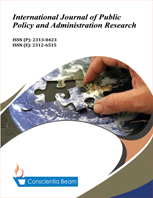Service innovation in public health: A case study of an Indonesian local government
DOI:
https://doi.org/10.18488/74.v11i1.3705Abstract
This study aims to investigate the innovation and efficacy of the integrated 112 Call Centre service in Parepare City, Indonesia, precisely in delivering healthcare services to the local population. The study aims to comprehend the effects of the Call Centre 112 service, its assimilation by the community, and the obstacles encountered during its execution. The study employs a qualitative methodology to elucidate the nature of service innovation and its effects on the community. The analysis assesses the comparative benefits, compatibility, level of difficulty, and feasibility of implementing the Call Centre 112 service. Furthermore, the study examines the obstacles the local government encounters in implementing service innovation and enhancing service quality. The study's findings demonstrate that the community has responded favourably to the Call Centre 112 service, which has exhibited encouraging patterns in assisting patients, particularly during the COVID-19 pandemic. The service has demonstrated a comparative advantage in terms of compatibility, trialability, and observability, which has contributed to its success in delivering prompt health care to the residents of Parepare City. Nevertheless, the report also underscores difficulties associated with public awareness and comprehension of the program. This research enhances the academic discourse on service innovation in public administration by offering valuable insights into the effects and difficulties associated with the implementation of the 112 Call Centre service in the health sector. The results have practical consequences for local governments and public health agencies, highlighting the significance of visibility and community acceptance in effectively carrying out healthcare advancements.

